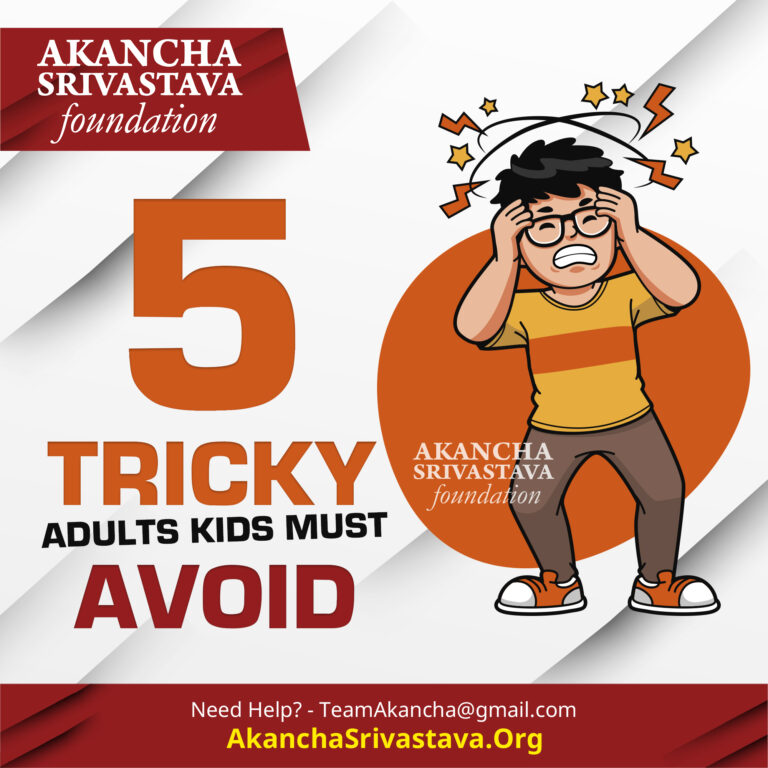5 Tricky Adults Kids Must Avoid
As the founder of the Akancha Srivastava Foundation, India’s largest initiative on cyber safety and child protection, I’ve spent years working with millions of children to build awareness about their personal safety. Through our extensive research and direct engagement with young minds, we understand that true protection comes from both vigilance and empowerment.
In a world where manipulative adults target children, it’s crucial for every parent to teach their child to recognize potential threats and trust their instincts. But this goes beyond just identifying harmful behaviors; it’s about nurturing critical thinking skills in children that empower them to make decisions, set boundaries, and communicate openly.
Let’s look at 5 types of tricky adults that children should be taught to avoid. By teaching children these important life skills, we equip them to make safer choices, speak out, and never feel obligated to tolerate unwanted behavior.
1. The Manipulative Complimenter
These adults use flattering words and excessive praise to build an emotional connection, often with the aim of gaining trust to manipulate your child. Compliments are then weaponized to break down boundaries, making children feel indebted or reliant.
Critical thinking is key here: teach your child to evaluate compliments and recognize when they’re used to gain an advantage. Encourage them to always ask, “Does this compliment feel sincere, or does it make me feel uncomfortable?”
2. The Emotional Manipulator
Some adults will attempt to manipulate a child’s emotions by making them feel guilty or responsible for things they didn’t do. They might say things like, “If you really cared, you’d help me.” This can lead to confusion and emotional distress, especially when the child feels torn between their natural instincts and the adult’s emotional pressure.
Empowering your child with emotional intelligence is crucial. Teach them that they don’t owe anyone an emotional response—they are not responsible for other people’s feelings. Let them know that their feelings are valid and that it’s okay to say “no.”
3. The Boundary-Crosser
Some adults ignore physical and emotional boundaries, often by touching a child when they are uncomfortable, or crossing into personal space without consent. This is an especially dangerous form of manipulation, as it confuses the child about their right to their own body.
Establishing boundaries early is essential. Talk to your child about their body’s “personal space” and how no one should make them feel uncomfortable with touch. Remind them that their body belongs to them alone—and they have the right to say “stop” at any time.
4. The Secret-Keeper
Adults who ask children to keep secrets are often creating a hidden agenda. These secrets isolate the child from the safety of open communication with trusted adults. When children are encouraged to hide information, they feel pressured to maintain a bond with the manipulator, further distorting their sense of safety.
Teaching your child to never keep secrets that make them feel uneasy is vital. Open communication must be the foundation of your relationship, and children must be told repeatedly that there is no secret too small to share with a parent, teacher, or trusted adult.
5. The “Gift-Giver” with Hidden Motives
Gift-giving can be a manipulative tool if it comes with strings attached. Some adults will use gifts to emotionally bind the child to them, making them feel obligated to return the favor or comply with a request.
Critical thinking and awareness come into play here: teach your children that gifts should be given out of kindness, not as a tool for manipulation. Help them understand that they do not owe anyone anything in return for a gift.
Empowering Your Child: The Path to Protection
- Teach Critical Thinking: Encourage your child to question everything—from excessive flattery to feeling uncomfortable around certain people. When they trust their instincts and think critically, they can navigate tricky situations with confidence.
- Instill Strong Boundaries: Let your child know that their voice matters, and they can set clear boundaries at any time. Whether it’s telling someone “no” or walking away from a situation, they have the power to act on their discomfort.
- Model Open Communication: Create an environment at home where open, honest communication is not just encouraged—it’s expected. Regularly talk to your child about who makes them feel safe and who makes them feel uncomfortable, so they know how to express themselves.
The Akancha Srivastava Foundation works tirelessly to educate children and parents about personal safety, boundaries, and building emotional intelligence. If you’re concerned about a tricky adult in your child’s life or want further support, please reach out to us at TeamAkancha@gmail.com.
Share this video with other parents—help spread awareness and make our children safer, one lesson at a time.
Stay Aware, Stay Safe!
Jai Hind!
🔔 Subscribe for more cyber safety insights!
👍 Like, share & comment to spread awareness!
CONTACT US:
Website: www.AkanchaSrivastava.Org
Email: TeamAkancha@gmail.com
Twitter: @AkanchaS
Instagram: @akanchas
https://www.instagram.com/akanchas/
Facebook:
https://www.facebook.com/akanchasrivastava1
LinkedIn:
https://www.linkedin.com/in/akanchasrivastava/
ABOUT ‘AKANCHA SRIVASTAVA FOUNDATION’
The Akancha Srivastava Foundation is India’s leading social impact initiative dedicated to advancing cyber safety awareness and education. Established in February 2017, this not-for-profit Section 8 organization is a trusted voice in promoting safe online practices across the nation.
Distinguished Board of Advisors
Guided by an honorary advisory board of esteemed leaders:
- Former Special DGP RK Vij (Chhattisgarh Police)
- ADG Navniet Sekera (Uttar Pradesh Police)
- ADG Krishna Prakash (Maharashtra Police)
- Dr. Poonam Verma (Principal, SSCBS, Delhi University)
Our Mission
The Foundation is committed to educating, empowering, and building bridges between the public and authorities on critical cyber safety issues. Additionally, we specialize in forensics training for law enforcement, equipping them with the skills needed to tackle cybercrime effectively.

